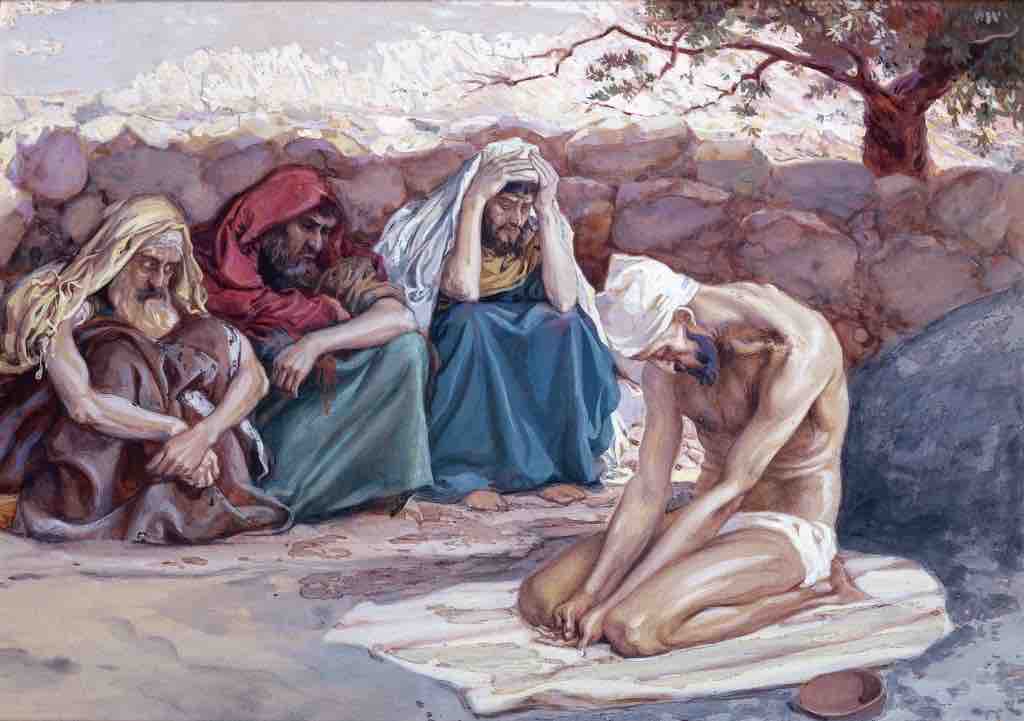The book of Job: surprising and rather difficult to understand
In the opinion of many Christians the book of Job is quite difficult to understand. This is not simply because of the themes it deals with: human suffering, the sovereignty and glory of God, and current religiosity.
It is mainly due to the surprising way in which the subject of suffering among men is staged. Indeed, the author does not adopt the ordinary angle of misfortune as a consequence of sin, but quite the opposite as the disconcerting experience of a series of disasters that fall on a man whom God himself declares to be upright, and this on two occasions (1.8 ; 2.3). We must therefore leave aside simplistic ideas and look at things closely.
1. The first two chapters
Introduction of the characters and the specific problem
As in a play, this is where we are introduced to the characters of the whole action and where the problem that will be the subject of the whole sequel is set. If the reader skips over the two scenes developed there, he will miss the essential message of the book. He will be able to draw some correct teachings, confirmed elsewhere in the Bible. But he will miss the particular point, the specific objective of the book of Job.
So let us look at the content of chapters 1-2:
First the central character: Job: 1.1 and his wealth —> 1.3d.
Chronologically we place him very far in the past, even before Abraham. One can admire the knowledge that these men – and especially Job – have of God, without any written revelation.
Then follows an impressive scene in heaven:
presented as so often in the Bible: sober, direct, with no ancillary details: 1.6-12.
Then comes the first chain of disasters
that brutally take away from Job all his flocks, many servants and even his children—> 1. 20-22!
New scene in heaven: —> 2.1-6.
He loses his health and the support of his wife: 2. 7-10.
And chap 2 ends with the arrival of 3 friends to comfort him.
.
2. The classical reading
A summit conference in heaven: Satan questions Job’s motivation
A summit conference is called by God in heaven. All the angels participate, including the fallen angel. The latter, despite his obvious arrogance, is accountable to God and the dialogue focuses on one human being in particular, Job. God knows him well and praises him impressively: « there is no one like him on earth ». Satan is forced to admit it, but this sower of doubt and lies questions Job’s motivation: 1:9-11; 2:4-6.
And twice a series of calamities falls on poor Job who loses successively :
all his possessions in a veritable flurry of catastrophic news, then his children, his health, the support and respect of his wife, the support of his friends.
What is left for him then? Let us imagine ourselves in his place:
a little life, but with constant pain, his attachment to God, but he has the deeply disturbing impression that God is not doing him justice and has even become his enemy. There are also his three friends who have come to comfort him, but with their obtuse minds they quickly get on his nerves and go so far as to make scandalous accusations about his integrity and his image of God.
Once this initial situation is noted, how do we understand the message of the whole book?
The vast majority of commentaries recognise the extreme nature of Job’s trials and explain that they were necessary to make him give up his self-confidence, ‘his pride’, they say, to make him admit his limited condition as a sinner. Others explain that these trials are necessary to deepen his spiritual life and introduce him to much greater blessings. This is not wrong, but it is a bit of a boilerplate. And above all, this is not the real issue of this book.
On the other hand, if the aim of the book is to show whether these trials will indeed confirm and strengthen Job’s faith, this book takes on a frightening aspect, because I would have to consider it normal to face such extreme situations in order to progress in my faith. Even in the face of lesser problems, am I able to say: « The Lord gave and the Lord has taken away…» (1.21) ?
Moreover, in this approach, the focus is on the man, on Job. He becomes an exceptional man who manages to stand up to such a deluge of hard knocks. He becomes a “hero of faith” (which is totally foreign to his mentality), a magnificent example, but difficult to match and, moreover, in a very distant past and a very different culture and set of circumstances.
3. The real issue
The real issue lies elsewhere: not in Job’s personality, but in the two dialogues between God and Satan.
To God’s praise of Job, Satan replies:
Does Job fear God for nothing (disinterestedly) ? Stretch out your hand on him…and I am sure he will curse you to your face .
Twice the devil issues this challenge, right in line with his arrogance as a troublemaker.
And then the big surprise: God accepts, while setting limits. He is and remains the Master of circumstances.
God accepts, because he knows Job. He has said that there is no other man like him on earth. He therefore believes that from such a man he can expect steadfastness in very hard events, i.e. a demonstration of unselfish, unconditional faith. Even in such extreme circumstances.
This demonstration will proclaim the glory of God
And when in the end it is proved that God was right, that he could indeed expect such love from man, that he is worthy of it as Creator and Master of the universe, this demonstration will proclaim, not by words, but by indisputable fact, the glory of God before the whole of creation and also in the face of the world of Satan, that sower of doubt and mischief.
God knows Job
God knows Job and believes in his faith, in the sincerity of his commitment, in the level of what Job should be able to endure.
He knows us too
He knows us too and believes that our love is genuine. And when He allows a trial, it is measured, measured according to our faith and spiritual maturity. It remains under the control of the Master of circumstances. But it gives us the opportunity to proclaim the glory of God to those around us and also to the unseen world, that we are serious in our attachment to God, that He is worthy of it as God and Saviour.
This time the focus is not on man, but on God.
The issue is not only the firmness of our faith and its progress, but a demonstration in deeds of the glory of God.
This is a dimension that must be clearly brought to my attention when a hard blow comes. This hard blow will not be as serious as those that hit Job, it will be on my scale, but I too will be able to bear witness, to the honour of God, that he is worthy of unconditional love, « for nothing » (1.9). This witness is possible at all levels of faith, even in the daily life.
This is the opposite of the views of Job’s three friends.
Their simplistic religiosity is certainly demanding and very high above the polytheism of their time. There are things that one should do and others that one should really avoid, and all this under the gaze of the divine Judge. If you do good, you will be blessed; if you do bad, you will be punished. And if Job suffered these terrible calamities, it is because he sinned grievously. All their efforts are united to make him confess this alleged sin, and when Job persists in talking to them about his justice, these so-called friends, who have come to console him, come to accuse him of lying, in cruel and merciless terms. In order to save their poor image of God and the system that follows from it.
They would get along well with some present-day Christianity which has forgotten just about everything in the Bible except the ten commandments.
They would also get along with the common Jews who read this book in their Bible. And therein lies another important meaning of this book.
And with a legalistic, give-and-take understanding of the Old Testament
Within the framework of the OT, too easily understood in a legalistic way, here is a book, perhaps the oldest of all, which vigorously rejects any legalistic religious scoriae, the commercial give-and-take dear to the three friends.
Job fears God because God is God
No, Job does not fear God because it brings something to God, nor because it serves him, but because God is God. God is worthy because of who he is, not simply because of all he gives to Job. The one true God, majestic in his sovereignty and gracious in his love and providence for man, deserves true, selfless love. This is one of the great characteristics of our faith in Christ.
A trial, even an incomprehensible one, is not enough to justify my withdrawing my trust in God, to deny him.
In a love relationship, both partners know and trust each other as a matter of course. We know that it is necessary and legitimate to believe in God, but do we think that God also believes in us, that is to say, that he believes that since his love is true, ours will also be true and will not evaporate in the face of a hard blow. This blow is known in advance, and therefore controlled by the Master of events, who gives it a constructive reason for being.
Job feels the need for a mediator
Job does not understand what is happening to him, this immense downpour that has suddenly fallen from a blue sky. Against all the unjust accusations of his poor comforters, he strongly feels the need for a mediator, a guarantor of his truthfulness before God. And he even has the intuition that this mediator would be God himself before God, that is, Christ.
4. A provisional assessment
Job feels the need for a mediator
It is truly amazing to discover the confidence of this man in God, who lived at least 4000 years before us. While we, we know the whole history of Israel and can read a detailed revelation of God at our leisure. Does this not mean that God does indeed reveal himself to those who sincerely seek him:
You will seek me and you will find me, when you seek me with all your heart » Jer 29:13
Current events confirm this by the testimonies we hear from people who have no personal access to the Bible and to whom God reveals himself today.
Job confused but still attached to God
Job is totally bewildered: he no longer understands what is happening to him. But he doesn’t let the insinuations of his wife and his friends get to him. « No,” he says, “I know that God loves me and he knows that I love him, I want to remain attached to him, I will not deny him. And in the end he will stand upon the earth, he will have the last word in this matter. Yet in my flesh I will see him and he will be favorable to me. Myself will see him with my own eyes… How my heart yearns within me ! » (19.27)
Alphonse Maillot, an insightful commentator, says that God hands over his cause to Job.
God believes that his love for Job is strong enough for Job to triumph in this test. Otherwise it would mean that his love could not do much. It is God’s fate that will be played out on earth, while Job’s fate is played out in heaven.
God is worthy of unconditional love
In the end, the opponent’s challenge to God, who takes it up, becomes God’s challenge to the opponent who will be defeated in fact. Yes, God is worthy of unconditional love, because there is no other God in creation, he is majestically holy and truly loving. This is a revenge on the event in the Garden of Eden where man had accepted Satan’s idea that God’s love was self-serving, that God wanted to preserve privileges for himself.
To be continued …
J-J Streng



